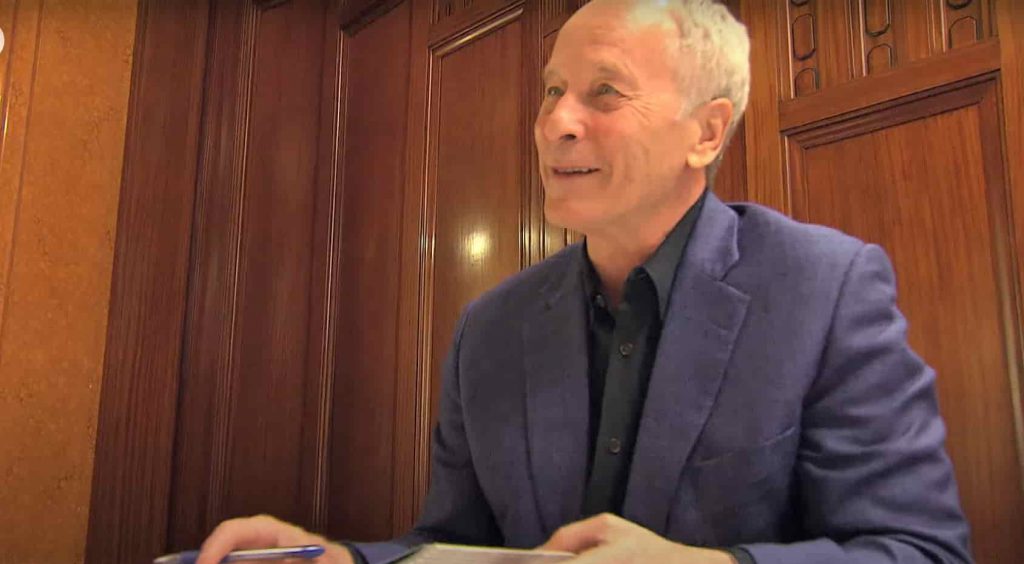A mother seeks 24 hours of freedom from her daily life in an exclusive story from the Pulitzer Prize-winning novelist. Eileen Lewis had taken the bus down from Ballycastle to spend the night with Tom Magee at the Maldron at the airport. Tom was off to Paris early, and Eileen was planning a day in Dublin. Not really to shop – though there were the arcades, and the nice little jewelry boutiques in Johnson’s Court, where she’d bought small things when she was at university, and still occasionally would step in.
She’d bought some pretty garnet earrings two years ago, though she’d no occasion for them and hadn’t seen them in some time. The day, though, was just to be a free day. A day in town.
Tom had married her old Queens’ room-mate, Marjorie Stearns. They lived in Westport, County Mayo, where he was in the offshore services business. An engineer or some such. Eileen was an integrated primary teacher. Marjorie was American – from New Hampshire. “Live Free Then Die”– was her joke about that. She was “fiercely independent” but otherwise humorless.
A barrister. Tom and Eileen had had this arrangement underway for four years since a night on the town – the four of them – at Pep’s, when Eileen was still married to Mick and the kids were little. Mick was long gone. The kids nine and eight. Eileen was 36. In Ballycastle now, she’d been “seeing” (the awful word) a good man named James Bowen, who fished and whose wife had died. With James, she could perceive a possibility.
He was mirthful, kind, liked music, had almost gone to Queens but for his father dying – the boat at risk of being abandoned. The familiar story of staying. James knew nothing of Tom Magee. Marjorie apparently knew nothing about Eileen. There wasn’t any long-range plan to be anything more. Only this. Three, four times a year, when Tom flew out – sometimes to America for seminars – and Eileen would come down on a pretext.
“Extra teacher training.” Extended ed. Not that James would’ve asked. No great wrongness to it, Eileen felt. Marjorie was a bit on the mannish side and probably didn’t afford Tom her full attention. Whereas Tom was artistic in spite of the engineering. He played coronet in the city musicale, went to the ballet, liked sailing, had been at Trinity reading English when the thought occurred to him he’d need to earn a living.
Far, indeed, from great wrongness, Eileen believed. Far from guilty sensations, or of some reckoning needing eventually to be faced. Instead, there was a great exhilaration of rightness. Tom’s life imbalances being put easily right without a grain of harm visited on a living soul. And her own.
A kind of tonic. Tom was certainly no one she’d choose for life. Quite dry. He had a boyhood limp and a professor’s beard and was losing hair. She’d likewise put on a stone cooking for the boys and felt her drive not as strong as once. F—— Tom Magee in the airport Maldron, then having a free day in town while he flew away to wherever was just a thing you did.
The same way being a single mum raising two boys in a shabby little one-street seaside town, where there was pitiful to do but go to work and to the bank and the pub with her fisherman beau, was a thing you simply did. Couldn’t not. It wasn’t the sex. That she could get any day and do. It was the lark of it. Tom was the smooth and occasionally pleasing way in for that. A portal.
In Dublin, she did very little. I took the airport coach in. Had a late breakfast at Bewley’s, when it was still open. Took a walk through Trinity – Tom’s college – where she’d once hoped to go, herself, but lacked the funds. Inside the walls was especially charming. She could walk about and never know where she was apt to come out. Plus, the little shops in the old part.
A pint at O’Neill’s, or the Duke, where the professors drank. Sometimes something would be on at the National Library – a talk or a recitation. Then that was that – the walk across the river to the bus, then the long trip north, when she’d sleep as the miles poured past. Friday (her Flexi day) over to Saturday. Sunday rest. School Monday. On the bus, she’d glance at the various riders and think they were all engaged in some similar escapade – only in the details were they different. She used to think – when there were still the red phone boxes – that when you saw a woman talking in a payphone you’d be certain something was in the works. Solo on the bus, the same. But again, you couldn’t not. It was such a small thing. Whereas to live (and die) on others’ terms was giving life away cheap. She wouldn’t do that.
THE LOGISTICS HAD BECOME SIMPLE AND CUSTOMARY:
Change in Ballymena to Europa station, then the Translink to the airport – climbing down amidst the other travelers going on to Galway and Cork. Take the courtesy van the short distance to the Maldron, walking in as though she owned it, with only a largish handbag. Tom would’ve phoned already with his room number.
The occasionally heart-pounding walk down the clean-smelling corridor, past the nodding, Philippine cleaners with their carts. Fingernails on the door. Then everything was commenced. If familiar, it was no less consuming and occasionally even frantic, coming close to violence, which she cared less about but Tom apparently needed as a measure of the ardor. He was 45, did the elliptical and free weights, in addition to sailing and the coronet.
Later – in bed – they would talk about subjects that were allowable and didn’t tread into the sensitive. She always asked politely about Marj, whom she hadn’t seen since this all took up and felt she would likely not see again. His work interested him still – being offshore; his company being bought by a good firm in Norway. He did not inquire about James, of whom she said little except that he existed and golfed.
Some talk arose about her boys and their difficulties with the father who lived now in Derry and saw them infrequently, which Eileen resented if only for the time lost. Tom and Marjorie had no boys or girls, and there was sometimes fitful, insincere talk of how one got old, etc. Eileen did not give much thought to growing old – only to being 40, which was coming up fast. And then what? They laughed about it.
Sometimes (not always), they would make love again. Though, if the residuum of their separate journeys worked to induce sleep instead of passion, they skipped it. Tom slept soundly and silently. She merely dozed, thinking about him in the highly restricted and fractional ways she felt were appropriate but not preoccupying. She knew him only a little when all was said, whereas Marjorie she knew better. They’d traveled to New Hampshire from university one fall break, met the educated, welcoming New England mother, the stern Antrim father, the special-needs sister; saw the family’s tall log house in the primeval woods.
Once she and Marjorie kissed and caressed on a walk along a forest trail, where the light was bright and crisp. She’d liked it; they’d both liked it – but never did it again or spoke of it, could never precisely meet each other’s gaze again, though they tried. Yes, there was a tedium to this business with Tom, the tedium of a long affair. And a betrayal. Though she liked him, he would touch his back, his bum, his thin hair while he slept. She could easily know him better, step into more serious questions (his fears, his dissatisfactions, his illnesses, his feelings about Marjorie) but would never be more intimate with him than this.
Exchange of personal data wasn’t intimacy; in fact, it could be intimacy’s death stroke. Her life with Mick had proved that beyond a shadow. Listening to Tom breathe, hearing his soft snores, the noises in his stomach, hearing the occasional – well, yes. And f—— him – in ways she enjoyed. This was as intimate as she cared for, and in large measure as much as she’d ever wanted or missed.
By 7 pm – dark in the winter, light in summer – they’d been in the room four hours. Tom always brought chablis and put it on ice. Dinner was proposed by him as a relief. The city, of course, was miles away – a 60 euro cab ride there and back. Though there was Malahide, even Swords, nearer places they could go and “dine”. An Indian, an Afghan, and two kinds of pasta – northern and southern. A taxi took you, a taxi brought you back. Never once did they fail to make love on rearrival. Usually for longer, often languidly with an appreciation for different details, a sense for the other that might’ve got lost in the earlier flourishes.
And then straight off to sleep, sometimes still “united”, often without good night. Just falling in, with silent consent. Tom would rise early, dress in the dark as she slept or pretended, and depart (his limp audible) after kissing her in the warm bedclothes. Once he’d whispered, “I love you.” Though even in sleep, she knew he’d misthought her for Marjorie. He never said it again. The last was the door softly clicking shut.
EILEEN AWOKE STARTLED, THINKING IT MUST BE 10 OR MORE:
The blackout curtains deceived the time. Tom was in Paris already. The empty chablis bottle a shadow beside the TV, the only remnant of him, other than the obvious. The day seemed to spring at her.
Though she saw it was only eight. She could hear the rumble and gathering thrust of the jets queuing not far away – the curtains muffling that, too. A peek through the gap revealed the roadway full up with cars off the roundabout. She herself could be going somewhere. Lisboa. Even America. A pleasing thought. James has talked about a trip to half-term. Nothing decided. It was only late January. There was a time.
She had, however, a terrible thirst, and a genuine hunger, as well. With Bewley’s shut, breakfast in town wasn’t the thing it’d been. There were the posh hotels – which were too pricey. Buswells was less but was too small and closed in. Plus the unlikeable feeling that one was in with a tour, some coach huffing outside, heading south. In Bewley’s, she’d felt a local, knew how the ordering scheme went, could read the papers ’til the shops opened.
Better to take breakfast here – as she and Tom had done twice when his flight was delayed. They’d stayed in bed, made love, though the cleaners had knocked, and the noise of the planes was distracting.
First a shower, though, then the blue wool slacks with the new jumper she’d bought at Debenhams when she’d taken the boys up. And the still stylish yet reliable boots in case the weather turned bad. And the Aquascutum. James’ present at Christmas, which she didn’t like. “You remind me of a spy,” he’d said when she put the thing on. “It must be how you think of me,” she’d said. He’d laughed. She had not. It wasn’t entirely fair.

